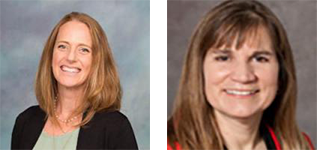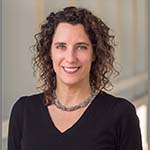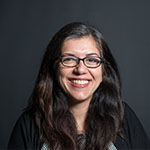SITT 2020 includes two types of pre-recorded content: interviews with faculty conducted by Dr. Andy Jones and talks by faculty and staff.

Shifting Expectations for a Practicum Course
Hannah Minter Anderson

This presentation will share lessons learned from shifting an applied practicum experience into a remote learning opportunity. Presenter will highlight assignment modification and plans for continuing equitable instruction in an online platform to ensure students leave with concrete skills applicable to their future careers. Read more...
Configuring Canvas for Clarity
Dr. Victoria Cross

Tips and rationale for organizing your Canvas site. Read more...
Using Zoom to Build Rapport
Dr. Victoria Cross

Tips and rationale for how to use Zoom to build rapport during live synchronous lectures. Read more...
Feedback Loops for Time-Efficient Grading and Better Student Writing
Dr. Grace Delmolino

Tired of spending hours giving feedback on written work, only for the exact same errors to pop up in the next batch of assignments? Harness the power of feedback loops to maximize grading efficiency AND generate better student writing. I’ll discuss how to build iterative assignments that help your students master the core skills of your class, how to give feedback so that students actually understand and incorporate it, and how I’ve used Google Docs to streamline the online feedback process. Read more...
Engaging Students and Building Community in Virtual Office Hours
Dr. Debbie Fetter

Instructor-student interaction has been shown to be a crucial factor to promoting student motivation and success in a class. In an online class, there are fewer opportunities for the students to interact with the instructional team compared to an in-person class. Feedback from the students signaled they desire to interact with the instructional team and their classmates more in an online setting. I wanted to encourage students to attend office hours in a low-stakes setting to review the material. Thus, sparked the idea to give students a purpose to attend virtual office hours: Study Hall Office Hours. Read more...
Enhancing Student Learning through Faculty and Librarian Collaboration
Dr. Elizabeth Maga, Dr. Jorge Peña, Melissa Browne, Erik Fausak, Melinda Livas





Faculty and librarians created engaging, active remote learning experiences to develop the information research skills of students enrolled in Animal Science (ANS2), Computer-Mediated Communication (CMN 172), and Video Games Theory and Research (CMN 176). This presentation will highlight the library modules we developed and mapped to course and departmental learning outcomes, the impact the activities had on student learning and lessons learned. Drs. Maga and Peña will share their perspectives through interviews. Read more...
Reading Groups in Online Teaching
Dr. Emily Klancher Merchant

This presentation describes an experiment in using student-led reading groups to improve student reading comprehension and give students a chance to discuss readings in small groups in a reading- and writing-intensive online course. Read more...
Faculty Development in the Time of Covid-19
Dr. Elizabeth Rice, Dr. Cara Sandholdt

This video will describe how the School of Nursing implemented a faculty development online series of modules and workshops on Best Practices in Online Education. It will include how the curriculum evolved as faculty became immersed in required online teaching due to Covid-19. Read more...
Effective Instructor Presence in Online Courses
Dr. Jeanette Ruiz

Instructor presence is a necessary and important feature for online learning environments. This presentation addresses why instructor presence is needed, details what the research tells us about student needs in this area, and provides ideas for how instructors can address instructor presence student-needs. Read more...

Beyond the Crisis: How UC Davis Can Improve Institutional Support for Online Teaching and Learning

Dr. Joe Anistranski
Dr. Anistranski thinks there needs to be a broader discussion of what we should ask of higher education institutions. In this interview, remote instruction and institutional support are discussed candidly, with Dr. Anistranski’s drawing upon prior online teaching experiences at three other institutions, and on lessons learned from his students and colleagues during this period of emergency remote teaching. Read more...
Online Science Education meets Face-to-Face

Dr. Arnold Bloom
To address the coronavirus pandemic of Spring 2020, many schools have substituted online instruction for traditional face-to-face instruction. Yet the efficacy of online instruction remains uncertain. Here Dr. Bloom compares the performance of 1,523 undergraduates at the University of California at Davis taking either an online or face-to-face version of an introductory course on climate change. He discusses findings and implications for instruction based on his study. Read more...
Instructional Choices and Modifications: Video, Assessment, and Engagement

Dr. Julia Chamberlain
In Spring 2020, Dr. Chamberlain taught a 400-student General Chemistry course using asynchronous lectures, synchronous exams, and a highly organized Canvas site. In this interview, she shares the choices she made for her first iteration of this online course, and how she modified these choices for the second offering of this class in Summer Session 1. In particular, she shares what she learned from editing 30 hours of video in the Kaltura platform, giving multiple low-stakes assessments online using Canvas and Gradescope, and balancing student engagement in real-time and student flexibility for asynchronous learning. Read more...
Tools and Metrics for Interactive Feedback and Skill Development

Dr. Annaliese K. Franz
Dr. Franz reflects on her use of GoReact.com as a platform for students to give pre-recorded asynchronous video presentations online, complete with valuable tools and metrics for interactive feedback and Q&A from faculty and peers. While her experience and insight is based on using this with >600 presenters in a two-day virtual conference, she anticipates the technology will offer pedagogical value for weekly online assignments that promote communication skills, content mastery, self reflection and student engagement via peer review of presentations. Read more...
Building a Sense of Community: Field Activities at a Distance

Dr. Laci Gerhart-Barley
The UC California Naturalist Program (CalNat) offers naturalist certification courses throughout the state. Under normal circumstances, these courses focus on hands-on, experiential learning in the field. In Spring 2020, the UC Davis CalNat course, Wild Davis, operated fully online, forcing a significant restructuring of activities. Group field activities were primarily replaced with online community and citizen science projects such as iNaturalist, which allow students to submit observations from their own backyard, compare their observations to other records, and see their classmates’ observations. Dr. Gerhart-Barley talks about how these projects provided an opportunity for field activities and helped build a sense of community despite geographic distance. Read more...
Supporting Labs: Student Assistants, Video Supplements, and Mobile Checkpoints

Nicholas Hosein
Nick Hosein discusses expanding teaching support with a number of strategies, including opportunities for high-achieving students to become student assistants, short and concise video lab supplements as replacements for the visual in-person aspects of a lab, and video checkoffs for documenting students’ lab progress. Read more...
Personality as a Remote Motivational "Tool"

Dr. Kirsten Harjes
Dr. Harjes talks about how to bring in herself and her personality as motivational "tools" to enhance her presence as an instructor; she also distinguishes her UC Davis course from run-of-the-mill online courses, commercial and otherwise. Dr. Harjes discusses motivating students to stay focused and attentive, including by bringing back instructional elements that she relied on before Zoom, including voice and volume modulations, appearance, body language, and facial expressions. You are invited to this discussion on how to “translate” the self to online and hybrid formats. Read more...
Faculty and Librarian Reflections: Enhancing Student Learning through Collaboration
Dr. Elizabeth Maga, Dr. Jorge Peña, Melissa Browne, Erik Fausak, Melinda Livas





Faculty and librarians reflect on their joint creation of engaging, active remote learning experiences to develop the information research skills of students enrolled in Introduction to Animal Science (ANS2), Computer-Mediated Communication (CMN 172), and Video Games Theory and Research (CMN 176). This group interview highlights the library modules they developed and mapped to course and departmental learning outcomes, the impact the activities had on student learning, and lessons learned from the collaboration. Read more...
Shifting to Remote Learning: Student Reflection Surveys and Recorded and Live Instruction Decisions

Dr. Mona Monfared
Dr. Monfared talks about how her in-person teaching will change from her experience teaching remotely, and the different formats she used for remote learning this past spring. She discusses weekly Canvas surveys capturing some of the active learning she does in class, finding that she wants to keep these weekly surveys when in-person instruction returns. Reasons for this include being able to ask fun questions and finding that students have said they appreciate having time to reflect on the class every week. She also talks about what she has found to be the benefits of asynchronous video versus synchronous instruction, as well as the drawbacks for each. Read more...
Pedagogical Variance Across Courses: Feedback from Student Engagement, Learning, and Surveys

Dr. Allen Pettey
Dr. Pettey rapidly converted to remote instruction and taught three courses concurrently during Spring 2020. To continue to meet the learning objectives of each course and to meet student needs as determined by the university's pre-quarter survey, each course reflected a different pedagogical approach. He discusses how student engagement, student learning, and response surveys provided feedback on the comparison of each instruction style. Read more...
Regular Emotional Self-Reflection Reduces Stress, Increases Engagement and Improves Academic Performance

Dr. Narine Yegiyan
In this interview, Dr. Yegiyan shares how she tracked students' emotional state throughout the 2020 Spring Quarter and how this affected students' academic performance and class engagement. The course she taught had four sections, in which three sections were asked to report their emotional states every time during class meetings, while the fourth section was just asked to report on a news of the day via the Canvas quizzes tool. She tracked anonymous student data and compared student grades and engagement in class and Canvas content, which showed steady improvement in performance for those encouraged to assess their emotional wellbeing. Read more...
